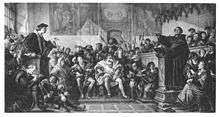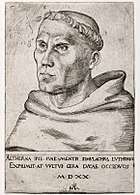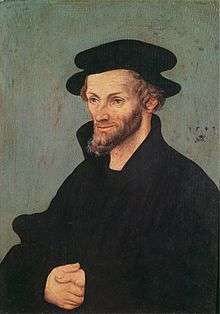Leipzig Debate
The Leipzig Debate (German: Leipziger Disputation) was a theological disputation originally between Andreas Karlstadt, Martin Luther, and Johann Eck. Karlstadt, dean of the Wittenberg theological faculty, felt he had to defend Luther against Eck's critical commentary on the 95 theses. So he challenged Johann Eck, a professor of theology at Ingolstadt university, to a public debate concerning the doctrines of free will and grace. The Leipzig Debate took place in June and July 1519 at Pleissenburg Castle in Leipzig, Germany. Its purpose was to discuss Martin Luther's teachings, and was initiated and conducted in the presence of George, Duke of Saxony, an opponent of Luther. Eck, considered the master debater in Germany, was concerned about clerical abuses, but his life's work had been dedicated to the defence of Catholic teachings and combating heresy.[1]

Eck invited Luther to join the debate, and when Luther arrived in July he and Eck expanded the terms of the debate to include matters such as the existence of purgatory, the sale of indulgences, the need for and methods of penance, and the legitimacy of papal authority.[2] Eck's debating skills led to Luther's open admissions of heresy in order to not be defeated. Luther declared that sola scriptura (scripture alone) was the basis of Christian belief, that the Pope had no power as he was not mentioned in the Bible, and condemned the sale of indulgences to the laity to reduce their time in purgatory, as there was no mention of purgatory in the Bible. Also, Luther's position on burning heretics (during the debate this was in reference to Jan Huss was later summarized as "Haereticos comburi est contra voluntatem Spiritus" (It is contrary to the Spirit to burn heretics)[3] as one of the statements specifically censured in Exsurge Domine.[4]
The debate led Pope Leo X to censor Luther and threaten him with excommunication from the Catholic Church in his June 1520 papal bull, Exsurge Domine, which banned Luther's views from being preached or written. There was much opposition to the bull, especially in north west Germany where sympathies for Luther were strongest.
A joint verdict on the outcome of the debate was to be issued by the University of Erfurt and the University of Paris, but the theological faculty of Erfurt recused itself. The faculty in Paris delivered a negative verdict on Luther's writings in 1521, but made no direct reference to the debate in Leipzig itself.
Participants
- Representatives from Wittenberg

 Andreas Karlstadt
Andreas Karlstadt Philipp Melanchthon
Philipp Melanchthon Nikolaus von Amsdorf
Nikolaus von Amsdorf
- Representative from Ingolstadt
 Johannes Eck
Johannes Eck
References
- AQA History, AS Unit 1, Philip Stanton p48
- Kolb, Robert (2009). Martin Luther. New York: Oxford University Press. p. 24. ISBN 0199208948.
- Haereticos comburi est contra voluntatem Spiritus in Google books, list of the Leipzig debate propositions
- Bainton, Roland H. (1950). Here I Stand: A Life of Martin Luther. Abingdon-Cokesbury Press.CS1 maint: ref=harv (link), pp. 145–147.